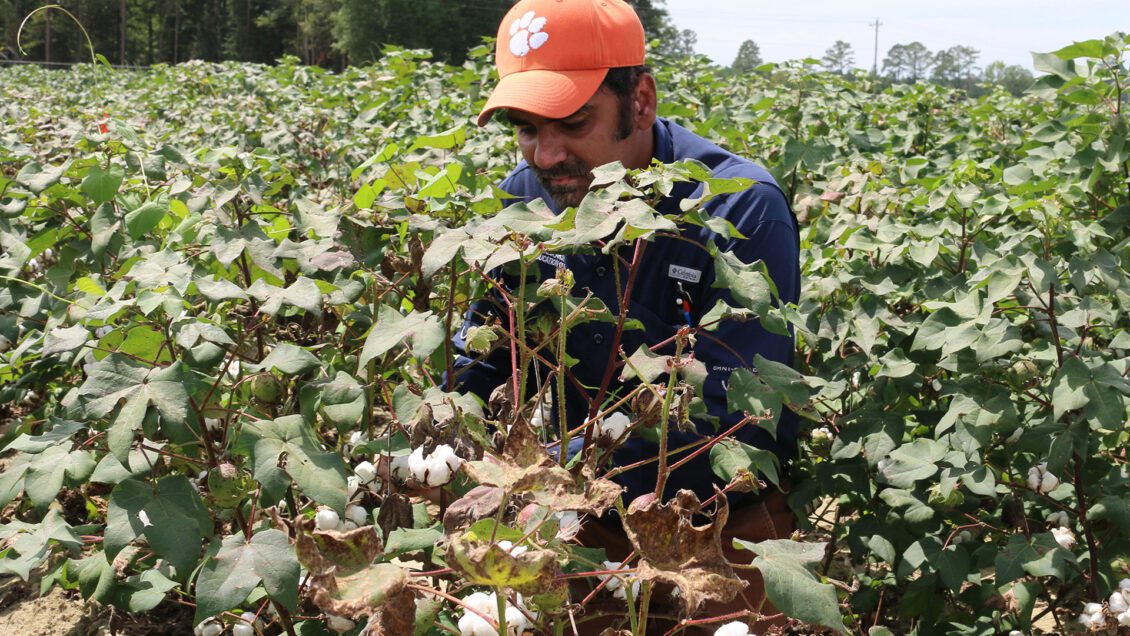
FLORENCE, S.C. – Cotton is the Earth’s primary natural fiber but climate change and other factors can stagnate yield gain and hamper fiber quality improvements.
Clemson University and United States Department of Agriculture (USDA) scientists want to develop improved breeding tools, namely DNA markers (molecular tags associated with a phenotypic trait), germplasm, and enhanced management practices to help boost U.S. cotton production.
Molecular tags mark or identify genes and their specific alleles (various forms of a gene). These tags help accurately describe phenotypic traits, which are observable traits such as height, biomass, leaf shape, etc.
This innovative research is being conducted at the Clemson University Pee Dee Research and Education Center (REC), 2200 Pocket Road, Florence, South Carolina 29506.
“Cotton accounts for one-quarter of global fiber consumption,” said Sachin Rustgi, a molecular breeder at the Pee Dee REC. “While there has been some progress made to cotton improvement for yield potential, improvements to fiber quality, adaptations to climate change and yield stability are still very much needed.”
Customized cropping systems can decrease environmental impacts, such as degraded soil, while maximizing ecosystem services, such as natural pest control in cotton production. During this study, the scientists plan to develop novel cotton cover cropping systems that conserve soil moisture, reduce fertilizer inputs and increase soil health for sustainable cotton production.

In addition, the scientists also plan to develop breeding methods to improve plant performance and broaden the genetic base. Broadening the genetic base increases diversity and gives breeders more cotton plant choices. This allows the scientists to find genotypes that perform better under certain environmental conditions or pest/pathogen pressures. Cotton production in the United States began from 12 founder genotypes, resulting in a narrow genetic base.
The Pee Dee REC houses state-of-the-art molecular biology labs capable of determining how much is expressed from various developmental stages in different genotypes. In this case, these genes regulate the fate of plant-growing tips or meristematic tissues that produce new growth, like animal stem cells.
Research conducted at the Pee Dee REC includes genomic DNA analyses to uncover associations between DNA markers and various observable and molecular traits, such as expression patterns of various genes. DNA is a molecule that contains a genetic code unique to every living organism.
Facilities in which the plants are grown for this research include walk-in and reach-in growth chambers, a greenhouse and fields.
“These facilities enable the testing of genetic materials in both controlled environments and natural settings,” Rustgi said. “Situated on prime agricultural land, the Pee Dee REC allows for the practical application of basic research findings, ensuring that technological advancements are implemented where they are most needed and will have the greatest impact for South Carolina farmers.”
In addition to Rustgi, other scientists participating in this research are Salman Naveed and Johnson Toyinbo, Clemson University doctoral students; Michael Jones, Clemson Extension cotton specialist; and Todd Campbell, United States Department of Agriculture research geneticist.
Clemson students help conduct important cotton research
Rustgi has a team of students helping him conduct his research at the Pee Dee REC. Below are a few images illustrating some of the students’ work.





Get in touch and we will connect you with the author or another expert.
Or email us at news@clemson.edu
